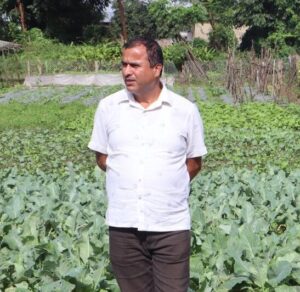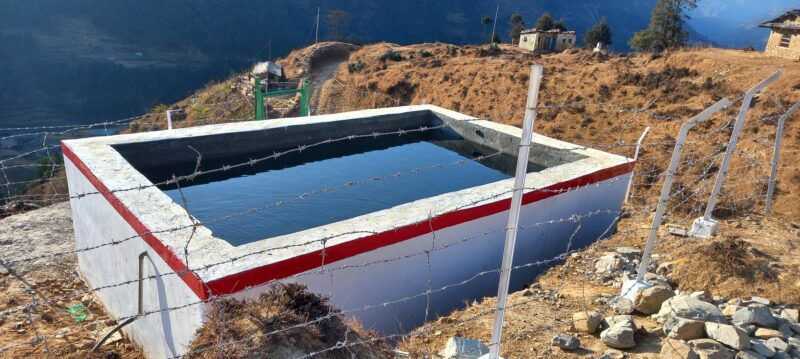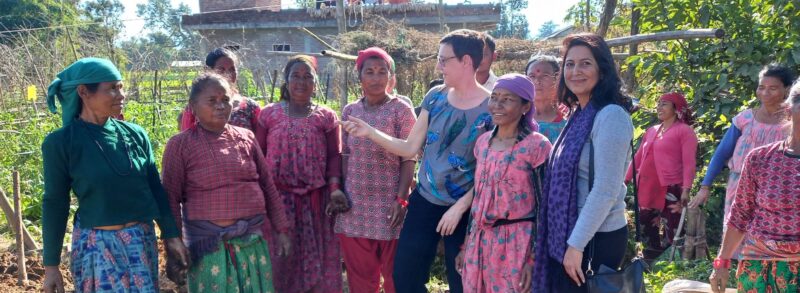UK public help turn the tables on climate change in Nepal
FarmingFood & agriculturePress release

A project funded through an appeal to the people of the UK is already helping thousands of rural Nepali farmers.
In 2021, Practical Action raised £3.5m for its turning the table on climate change appeal focused on helping farmers cope with extreme climate change.
This initiative has had a transformative impact, significantly improving the lives of hundreds of thousands of people.
In Nepal, rural households have traditionally maintained a subsistence livelihood with limited opportunities in off-farm employment.
Lack of income, coupled with insufficient food, disproportionately affects women farmers who are often left to look after children and elderly relatives whilst keeping homesteads.
Climate change is making this situation worse. Unpredictable rain patterns, drought, heat, and new pests are all combining to make farming more difficult, particularly in remote, rural areas.
The work was funded via donations of £1.75m from UK public, which was matched by the UK government. This has been instrumental in fostering change for these communities.
Through combining several different ways of working, thousands of farmers have been empowered to adapt to climate change, enhancing their livelihoods whilst increasing their resilience.
The work is boosting the income of smallholder women farmers and marginalised groups by helping them to double their food production and increase their income through climate smart agriculture techniques.

Dev Datta Bhatta, Practical Action’s Manager for the Building climate resilient farming project said,
“I am delighted that our interventions in agricultural production and off-farm employment are yielding results.
“Involving farmers in commercial vegetable farming, establishing market centres with strong market connections, establishing enterprises with a focus on developing entrepreneurial capacities, reducing drudgery using labour-saving devices, and implementing various awareness interventions, are actively contributing to the enhancement of economic and social resilience of the communities.
“The progress we’re witnessing in the project fills me with optimism, reassuring me that we’re on track to achieve our objectives of benefitting the communities.”
The project focuses on three communities in Nepal: Dang, Rolpa, and Rukum East. These communities face high levels of poverty, marginalization, and vulnerability. Factors such as poor soil quality, low literacy rates, limited access to money and markets, and the adverse effects of climate change, including unpredictable monsoon rains and reduced winter rainfall, have hindered agricultural productivity, and affected livelihoods.
The program has helped over 6,000 farmers benefit from improved basic needs provision such as nutrition, housing, healthcare, and education. This initiative is transforming the lives of farmers, a majority of whom are women burdened by the impacts of climate change, social norms, and limited market access.

Laxmi Budha Magar, a farmer in Banfe, Tribeni, Rolpa said,
“Initially, we faced an acute water shortage and relied on rainwater for agriculture interventions. Irrigating the farms required fetching water from a spring source for about two hours to fill a bucket, which was very difficult. But thanks to the installation of solar irrigation system, we now have plenty of water and do not have to work hard for irrigation.
“We used to cultivate one crop per year. But now, we can cultivate vegetables in 2 to 3 seasons annually. Solar irrigation has encouraged us to be involved in vegetable production at a commercial scale. The vegetable production has helped us double our annual income. Further, the irrigation facility has also reduced women’s workload by decreasing the time required to collect water for irrigation.”
The project, which has been underway for the past eighteen months, has so far achieved the following:
- Improved the economic and social resilience of marginalized groups through market-oriented agriculture production and off-farm employment. Of the targeted 6,000 beneficiaries, including 4,800 women and 217 people with disabilities, the project has reached 5,565 unique direct beneficiaries to date, representing 93% of the total target.
- Established Climate Field Schools (CFS) These schools provide farmers with training on commercial vegetable farming, agroecology, and regenerative agriculture practices. Through the adoption of climate-resilient varieties, improved irrigation services, and soil management practices, farmers have doubled their annual income. The adoption of two new climate-resilient vegetable varieties, namely cauliflower-green hot and cucumber-Bhaktapur local.
- Installed three solar-powered lifting irrigation systems and 29 irrigation systems, benefitted 990 households, and irrigated approximately 1,952 ropani (97.6 hectares) of land. 88 local extension service providers have also been trained to provide agriculture extension services in the communities. These initiatives have resulted in greater satisfaction with agricultural input services among 1,210 farmers, including 897 women.
- Strengthened market systems and fostering linkages between farmers and market actors. Participatory workshops conducted to identify challenges in the existing market system and develop solutions. As a result, 11 vegetable collection centres, four dairy collection centres, and four dairy sub-collection points have been established or upgraded. Furthermore, 13 business interaction meetings were held to strengthen the market, and formal/informal contracts were established with traders. The market infrastructure interventions have garnered satisfaction from 885 farmers, including 656 women.
- Facilitated the development of vocational skills among 161 individuals, and 204 people have gained employment or become self-employed through various enterprises at the local level. Cooperatives responded to the needs of beneficiaries by introducing two types of new subsidized loan services.
- Labour-saving devices, such as electric corn shellers and farm rakes, have been provided to 70 Climate Field Schools, benefiting women farmers by saving time and labour. This has allowed them to engage in more profitable livelihood activities, participate in group meetings, advocate for women-focused programs, and demand irrigation infrastructure. Awareness and sensitization training events, targeting around 2,607 community members, have been conducted to challenge discriminatory social norms and promote empowerment in decision-making, resource access, income control, and leadership positions.
Basanta Chaudhary, a farmer from Kumalgadhi, Dangisharan said:
“We regularly conduct the climate field schools (CFS) in our community and have learned new things from there, especially on agroecology and regenerative agriculture practices.
Learning from the school, I have prepared improved compost manure, bio-pesticides and bio-liquid manure and have been using it in the vegetable farm since last season. This has contributed to enhancing production and productivity”.
The building climate adaptive farming opportunities and improved livelihoods for women and marginalised groups project is funded by the UK Aid Match, a programme that matches public donations to aid projects and managed by Practical Action and Development Concern Society (DECOS).
